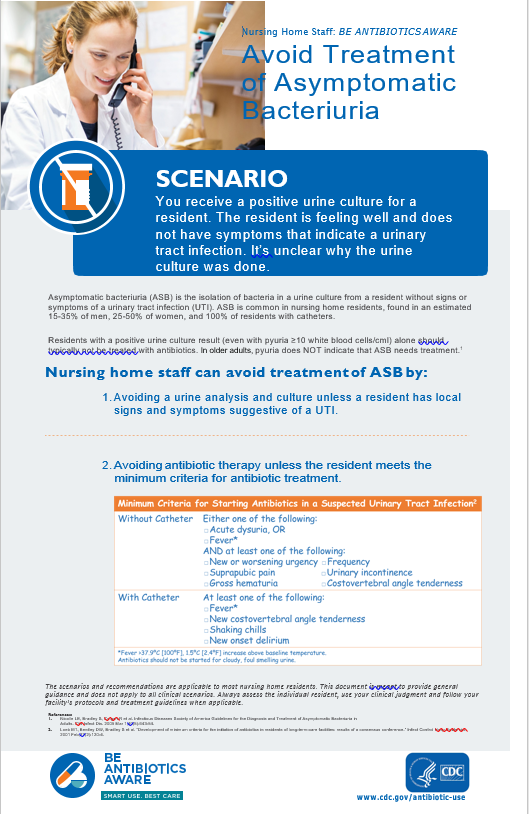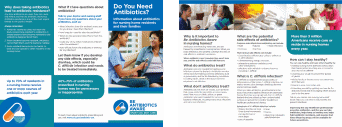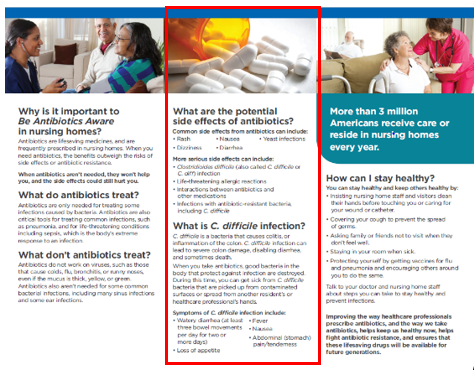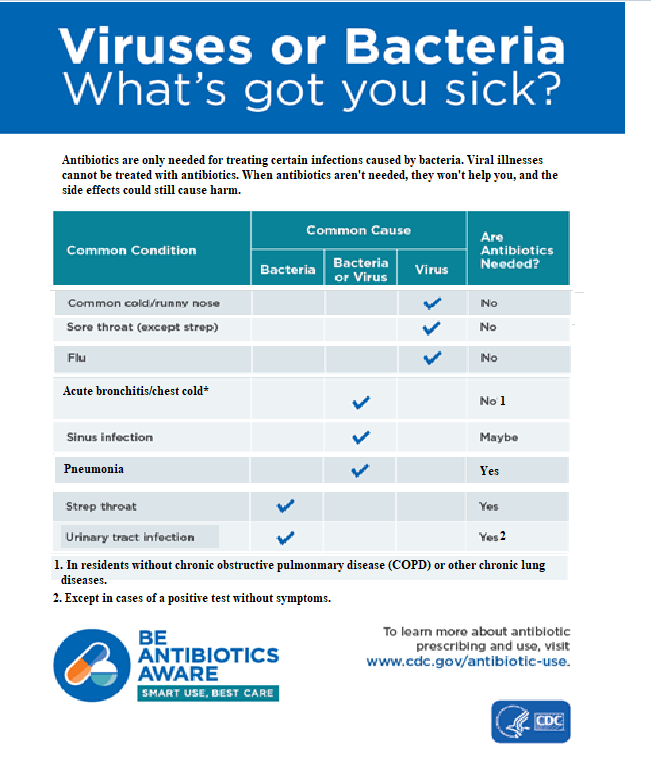Interviewer Guide for Nurses in Nursing Homes
CDC and ATSDR Health Message Testing System
GUIDE - Nurse_CLEARED_2019-10-02
Message and material testing for the Be Antibiotics Aware (BAA) campaign for healthcare providers (HCPs)
OMB: 0920-0572
Form Approved
OMB Control No.: 0920-0572
Expiration date: 8/31/2021
FINAL – DHQP and NCEZID cleared
Antibiotic Use Educational Effort – Interviewer Guide
Healthcare Providers (HCPs) – Nursing Home Nurses
Welcome, overview, and rules [2-3 minutes]
Thank you for taking the time to join us for this interview. My name is [INSERT NAME] and I work for ICF, a private firm, who is conducting research on behalf of the US Centers for Disease Control and Prevention, or CDC, who is sponsoring this health communication campaign. I want to take a few minutes to tell you what to expect from our conversation and go over the informed consent.
ICF is conducting this study on behalf of CDC to learn about antibiotic prescribing in nursing home settings and to gather feedback on communication materials for CDC’s campaign to improve antibiotic use. This information will be used to improve the materials that you see.
Remember your participation is voluntary. That means you can stop us at any time and if you are uncomfortable with a question, or if you simply don’t have a response, it is fine to pass.
Our discussion should take about one hour. Your name and any identifiable information you may share during our discussion will not be included in our final report, so no responses will be linked to you directly. I don’t expect you to tell me anything that you would be uncomfortable sharing, but hope that you will be honest with your responses to the questions I ask.
Please speak up and speak clearly. We are audiotaping the discussion so that we can have an accurate record of the discussion. We have observers from CDC and ICF listening and taking notes during our discussion today. We also have a technology support person to assist with any with any technical needs during our discussion.
Do you have any questions before we get started?
Begin recording and ask: We are now recording this session. I want to ask you again,
Do you agree to participate in this interview?
Do you consent to us recording your responses?
Understand providers’ perceived role in improving antibiotic use. [10 minutes]
Ok, great. Let’s get started. I’d like to start our conversation by hearing your thoughts about antibiotics.
Do you think you, as a nurse, have a role in improving antibiotic use in nursing home settings?
PROBE: [For either response] Why?
PROBE: [If yes] What actions do you currently take to improve antibiotic use?
PROBE: [If yes] What actions could you take (i.e. education, antibiotic review)?
PROBE: [If yes] Do you feel that learning about improving antibiotic use for specific infections can help you improve resident care?
In general, do you feel antibiotics are sometimes prescribed when they aren’t needed to nursing home residents?
PROBE: [If yes] What would you say are the most significant drivers of inappropriate antibiotic prescribing?
Do you encounter any challenges/barriers around improving antibiotic use? If so, what are they?
PROBE: Do you encounter any difficulties in communicating with prescribers?
PROBE: Do you encounter pressure from families related to antibiotics?
PROBE: What would make it easier for you to support improvement in antibiotic use?
What policies, if any, are you aware of in your nursing home related to antibiotic prescribing?
PROBE: What policies do you think would be most effective in improving antibiotic use in your facility?
Have you ever seen, heard, or read any TV, radio, newspaper, or online advertising about Be Antibiotics Aware?
PROBE: [If yes] Where have you seen or heard about Be Antibiotics Aware?
On TV?
On Social media?
Through e-mail?
On a website?
Gather feedback on CDC materials that can help to optimize antibiotic prescribing in nursing homes - test Avoid Treatment of Asymptomatic Bacteriuria poster [15 minutes]
 In
the last few minutes, we discussed your thoughts around antibiotic
prescribing. Now, let’s move on to our first material. Take a
few minutes to read this and then we’ll discuss (give 3-4
minutes to read).
In
the last few minutes, we discussed your thoughts around antibiotic
prescribing. Now, let’s move on to our first material. Take a
few minutes to read this and then we’ll discuss (give 3-4
minutes to read).
Let’s start with some questions about the content in this material.
Do you think asymptomatic bacteriuria is an important topic to learn more about in nursing home settings? Why? Or why not?
What do you like about this material?
PROBE: What about the length of this material?
How could this material be improved?
PROBE: Is there anything that is confusing or needs clarification?
PROBE: Is there anything else you would like to see included in this material?
PROBE: Do you think this information should be presented in a different format?
PROBE: [If yes] What type of formats would you like to see (i.e. video, role playing)? And, why would you prefer this/these formats?
PROBE: [If no] Why?
Would you use this material?
PROBE: [For “No”] Why?
PROBE: [For “Yes”] How?
PROBE: Would you recommend it to others?
Overall, if provided to nurses, how helpful do you think this material is /would be for improving antibiotic use in nursing homes?
PROBE: [For any response] Why?
Is there another clinical scenario you would like to see in the same format as this material (i.e. pneumonia)?
Now I have a few questions about the visual aspects of this piece.
What do you think about the layout of information in this material?
Overall, how appealing is this material to you? (HMTS 7e)
Would it catch your attention if you saw it somewhere (HMTS 9e) Would you stop to read it?
Where would you expect to find this material for you to use?
PROBE: What about on CDC’s website?
PROBE: What about on a state health department website?
PROBE: What about in publications or during yearly conferences from professional societies, like the Gerontological Advanced Practice Nurses Association (GAPNA), National Association of Directors of Nursing Administration in Long-Term Care (NADONA), or others?
Gather feedback on Do You Need Antibiotics? brochure that can help NH nurses educate residents and their families about antibiotic use, focusing on adverse events of antibiotics. [15 minutes]

Ok,
let’s move on to our second material. Please take a few minutes
to read though it before I ask questions (give 4-5 minutes).
Overall, how helpful do you think this brochure is / would be in providing education for residents and their families about appropriate antibiotic use?
PROBE: [For any response] Why?
PROBE: [For “Not helpful”] Would putting this information in a different format be more helpful to provide education to residents and families? If so, what format?
PROBE: Would you use this brochure to provide education for residents and their families? Why or why not?
PROBE: Is there anything else that residents and their families ask you about antibiotic use that isn’t covered in this brochure?
PROBE: Is there anything residents and their families should know about antibiotic use that isn’t covered in this brochure?
What’s your general reaction to the way this brochure looks? (HMTS 6e)
PROBE: What do you think about the layout of the information?
PROBE: What do you like about this brochure?
PROBE: How could this brochure be improved?
Are there any other types of materials or resources that you think would be helpful to educate residents and their families about appropriate antibiotic use?
PROBE: What about letters, short videos, presentations during resident council meetings or other meetings?
Let’s look specifically at the side effects section in this brochure:

In a typical week, how often do you talk to your residents and/or their families about possible side effects related to antibiotic use?
PROBE: How do you generally counsel residents and their families about antibiotic-related side effects?
PROBE: What side effects do you typically talk to them about?
PROBE: What about C. difficile infection?
Do you think informing residents and their families about possible antibiotic-related side effects could reduce pressure to prescribe unnecessarily?
PROBE: [For either response] Why?
Do you think this section would help you provide education to residents/their families about possible antibiotic-related side effects?
PROBE: [For yes or no] Why?
PROBE: Is there any other information about antibiotic side effects that residents/their families ask you that isn’t covered in this section?
PROBE: Is there anything residents/their families should know about antibiotic use side effects that isn’t covered in this section?
Gather feedback on Viruses or Bacteria: What’s Got You Sick? chart that can help NH nurses educate residents and their families about antibiotic use for specific infections. [15 minutes]
 Now,
let’s move on to our last material. Take a few minutes to read
this and then we’ll discuss (give 1-2 minutes to review).
Now,
let’s move on to our last material. Take a few minutes to read
this and then we’ll discuss (give 1-2 minutes to review).
Overall, how helpful do you think this chart is / would be in providing information for residents and their families about when antibiotics are needed for infections caused by bacteria?
PROBE: [For any response] Why?
PROBE: [For “Not helpful”] Would putting this information in a different format be more helpful to provide education to residents and families? If so, what format?
PROBE: Would you use this chart to provide education for residents and their families? Why or why not?
PROBE: Is there anything else that residents and their families ask you about antibiotic use for specific infections that isn’t covered in this chart?
PROBE: Is there anything residents and their families should know about antibiotic use for specific infections that isn’t covered in this chart?
Do you think including urinary tract infections in this chart is helpful, or should this chart focus on respiratory infections?
Do you think a similar material for any other infection(s) can help improve antibiotic use?
What’s your general reaction to the way this chart looks? (HMTS 6e)
PROBE: What do you think about the layout of the information?
PROBE: What do you like about this chart?
PROBE: How could this chart be improved?
Are there any other types of materials or resources that you think would be helpful to educate residents and their families about appropriate antibiotic use for specific infections?
PROBE: What about letters, short videos, presentations during resident council meetings or other meetings?
Closing [2-3 minutes]
Well, that’s the last of my questions. Do you have any comments or questions that you’d like to bring up before we end our discussion?
Thank you again for taking the time to participate in this discussion. Please visit www.cdc.gov/antibiotic-use for more information on appropriate antibiotic prescribing.
We sincerely appreciate and value your input!
Public reporting burden of this collection of information is estimated to average 60 minutes per response, including the time for reviewing instructions, searching existing data sources, gathering and maintaining the data needed, and completing and reviewing the collection of information. An agency may not conduct or sponsor, and a person is not required to respond to a collection of information unless it displays a currently valid OMB Control Number. Send comments regarding this burden estimate or any other aspect of this collection of information, including suggestions for reducing this burden to CDC/ATSDR Reports Clearance Officer, 1600 Clifton Road NE, MS D-74, Atlanta, Georgia 30333; ATTN: PRA 0920-0572
| File Type | application/vnd.openxmlformats-officedocument.wordprocessingml.document |
| Author | Wiedeman, Kathryn (CDC/OID/NCEZID) |
| File Modified | 0000-00-00 |
| File Created | 2021-01-15 |
© 2026 OMB.report | Privacy Policy